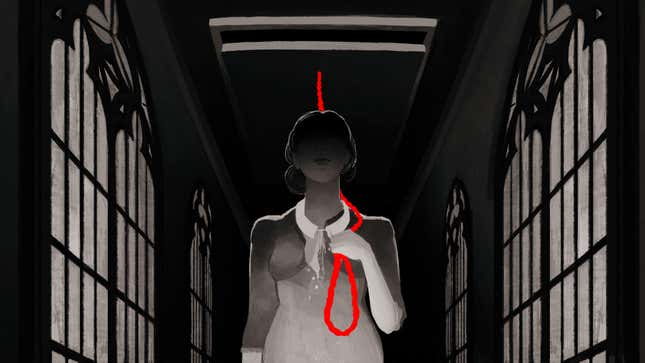'The Nihilistic Horniness of a Good Gothic Read': Ranking the Genre's Sexiest and Scariest Secrets
In DepthIn Depth

Like many American girls, I was still in elementary school the first time I pilfered a copy of Flowers in the Attic and locked myself in a room to read it under the secrecy of covers. The story itself is scary: four children locked in an attic by a family that cares for them as little as they care for cast-off furniture. My home life was shitty, and I was already starting to learn that familial love wasn’t ever going to be the stuff of a Louisa May Alcott novel.
Besides that, once a week, I was treated to evangelical yellings about the sin my body was built for long before I even understood what a penis was or how one might come to be close to me. Sex was haunted by the judgment of the Father, Son, and Holy Spirit before I understood its logistics, and so the palpable longing of Cathy for her brother, Chris, as they whiled away their time in the attic seemed really no worse than the depravity I’d already been told was inevitable.
In her article about Shirley Jackson’s not-very-subtle advocacy for matricide, “House Mothers and Haunted Daughters: Shirley Jackson and the Female Gothic,” Roberta Rubenstein defines the Gothic novel as a work that “pivot[s] upon anxieties about selfhood and entrapment, represented through bizarre or exaggerated events that may or may not be explained as manifestations of the (typically) female central character’s troubled imagination.” That’s a pretty good working definition of the genre, but it ignores one crucial element: the nihilistic horniness of a good Gothic read.
A Gothic novel almost always centers on an impoverished, fatherless female attempting to navigate the treacherous halls of a haunted house while also playing a dangerous game of Snakes and Ladders with a patriarchy that wants her, with or without her consent. Hand-in-hand with those terrors is good old human sexuality. The pussy wants what it wants, even if that desire manifests itself as a monster, a captor, or sometimes even a brother. The ideas a good Gothic novel plays with are perverse, and though we don’t like to admit it in polite company, sometimes unsettlingly sexy.
It is common knowledge in the Gothic novel that unwittingly inspiring the wrong erection can literally be lethal, and young women are constantly fighting their way through the deadly boners to the friendly ones, only to find that sometimes, they’re one and the same
As the news cycle is increasingly shaded by real-life horror stories that have, until now, been recounted only in whispers, a question keeps popping up on my Twitter timeline: Why on earth are we still fucking these awful men? It’s an important question with no good answer, and one Gothic novels have been asking for ages. It is common knowledge in the Gothic novel that unwittingly inspiring the wrong erection can literally be lethal, and young women are constantly fighting their way through the deadly boners to the friendly ones, only to find that sometimes, they’re one and the same (looking at you, Rebecca). The result is books that read like fevered nightmares driven by the situational insanity of being biologically attracted to your oppressor.
Recently at a bar, a man who was hoping to fuck looked at me as if he’d just discovered the neutron chain reaction that might give birth to an atomic bomb: “I get it,” he said, “you’re a little bit crazy.”
The very idea of even considering intercourse in a bar with stories of rapey shitsacks blaring out of overhead televisions is crazy. It doesn’t make any sense, yet still, we consider it—and even do it—with the right men and the wrong. I answered on behalf of myself as well as my girls V.C. Andrews, the Brontës, and Shirley Jackson.
“You have no fucking idea,” I told him.
So in the spirit of Halloween and the never-ending, twisting Gothic reality of navigating the world in a woman’s body, here’s a definitive ranking of Gothic novels based on how well they balance the thin red tightrope between sexy and scary.
-

-

-

-

-

-

-

-

-

-

-

-

-

-

-

-

-

-

-

-

-

-

-

-

-

-

-

-

-

-

-

-

-

-

-

-

-

-

-

-








































